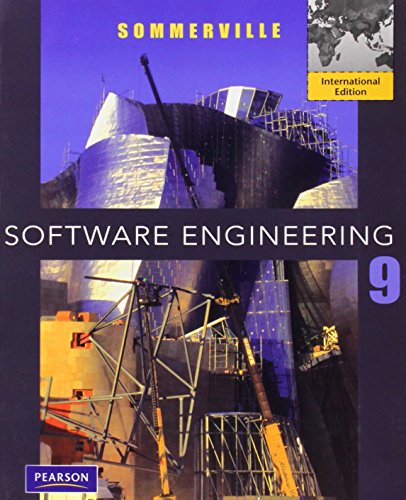
Synopsis
Software Engineering presents a broad perspective on software systems engineering, concentrating on widely used techniques for developing large-scale systems. The objectives of this seventh edition are to include new material on iterative software development, component-based software engineering and system architectures, to emphasize that system dependability is not an add-on but should be considered at all stages of the software process, and not to increase the size of the book significantly.
To this end the book has been restructured into 6 parts, removing the separate section on evolution as the distinction between development and evolution can be seen as artificial. New chapters have been added on:
Socio-technical Systems - discussing the context of software in a broader system composed of other hardware and software, people, organisations, policies, procedures and laws.
Application System Architectures - to teach students the general structure of application systems such as transaction systems, information systems and embedded control systems. The chapter covers 6 common system architectures with an architectural overview and discussion of the characteristics of these types of system.
Iterative Software Development - looking at prototyping and adding new material on agile methods and extreme programming.
Component-based Software Engineering - introducing the notion of a component, component composition and component frameworks and covering design with reuse.
Software Evolution - revising the presentation of the 6th edition to cover re-engineering and software change in a single chapter.
The book supports students taking undergraduate or graduate courses in software engineering, and software engineers in industry needing to update their knowledge.
"synopsis" may belong to another edition of this title.
From the Back Cover
Intended for a sophomore/junior level course in software engineering.
The ninth edition of "Software Engineering" presents a broad perspective of software engineering, focusing on the processes and techniques fundamental to the creation of reliable, software systems. Increased coverage of agile methods and software reuse, along with coverage of 'traditional' plan-driven software engineering, gives readers the most up-to-date view of the field currently available. Practical case studies, a full set of easy-to-access supplements, and extensive web resources make teaching the course easier than ever.
The book is now structured into four parts:
1: Introduction to Software Engineering
2: Dependability and Security
3: Advanced Software Engineering
4: Software Engineering Management
About the Author
Ian Sommerville is a full Professor of Software Engineering at the University of St. Andrews in Scotland, where he teaches courses in advanced software engineering and critical systems engineering. His research interest lies in complex, dependable systems.
Ian Somerville is the recipient of the 2011 ACM SIGSOFT Influential Educator Award. This honor is in recognition of the tremendous and positive influence that his Software Engineering textbook and companion educational aids have had on undergraduate software-engineering education, as well as his textbooks on Requirements Engineering, and achievements in establishing the SICSA Graduate Academy.
"About this title" may belong to another edition of this title.
Other Popular Editions of the Same Title
Search results for Software Engineering
Software Engineering: International Edition
Seller: WorldofBooks, Goring-By-Sea, WS, United Kingdom
Paperback. Condition: Fair. A readable copy of the book which may include some defects such as highlighting and notes. Cover and pages may be creased and show discolouration. Seller Inventory # GOR006817503
Buy Used
Quantity: 1 available
Software Engineering
Seller: Better World Books Ltd, Dunfermline, United Kingdom
Condition: Very Good. International ed of 9th revised ed. Ships from the UK. Former library book; may include library markings. Used book that is in excellent condition. May show signs of wear or have minor defects. Seller Inventory # 7611828-6
Buy Used
Quantity: 2 available
Software Engineering
Seller: Better World Books Ltd, Dunfermline, United Kingdom
Condition: Good. International ed of 9th revised ed. Ships from the UK. Former library book; may include library markings. Used book that is in clean, average condition without any missing pages. Seller Inventory # 8603863-6
Buy Used
Quantity: 2 available
Software Engineering
Seller: Greener Books, London, United Kingdom
Paperback. Condition: Used; Very Good. **SHIPPED FROM UK** We believe you will be completely satisfied with our quick and reliable service. All orders are dispatched as swiftly as possible! Buy with confidence! Greener Books. Seller Inventory # 4870079
Buy Used
Quantity: 3 available
Software Engineering (Volume 9)
Seller: Anybook.com, Lincoln, United Kingdom
Condition: Good. Volume 9. This is an ex-library book and may have the usual library/used-book markings inside.This book has soft covers. Clean from markings. In good all round condition. Please note the Image in this listing is a stock photo and may not match the covers of the actual item,1200grams, ISBN:9780137053469. Seller Inventory # 9816691
Buy Used
Quantity: 1 available
Software Engineering
Seller: Anybook.com, Lincoln, United Kingdom
Condition: Good. This is an ex-library book and may have the usual library/used-book markings inside.This book has soft covers. In good all round condition. Please note the Image in this listing is a stock photo and may not match the covers of the actual item,1100grams, ISBN:9780137053469. Seller Inventory # 5585032
Buy Used
Quantity: 1 available
Software Engineering: International Version
Seller: medimops, Berlin, Germany
Condition: good. Befriedigend/Good: Durchschnittlich erhaltenes Buch bzw. Schutzumschlag mit Gebrauchsspuren, aber vollständigen Seiten. / Describes the average WORN book or dust jacket that has all the pages present. Seller Inventory # M00137053460-G
Software Engineering
Seller: Toscana Books, AUSTIN, TX, U.S.A.
Paperback. Condition: new. Excellent Condition.Excels in customer satisfaction, prompt replies, and quality checks. Seller Inventory # Scanned0137053460

